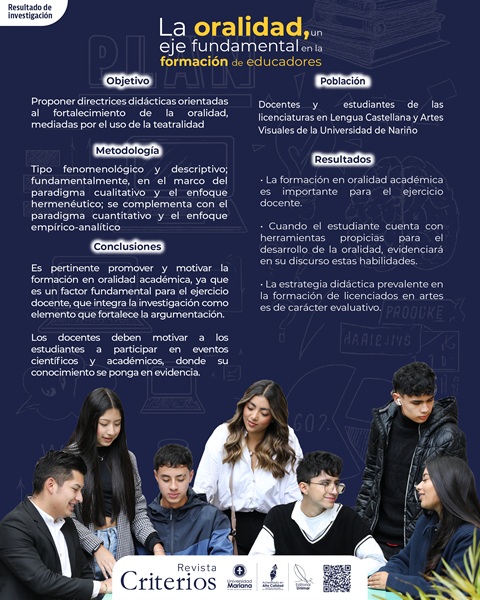Academic orality, a fundamental axis in the training of educators
DOI:
https://doi.org/10.31948/rc.v32i1.4307Keywords:
academic orality, discourse, oral expression, pragmatics, active learningAbstract
Teaching, which is fundamentally a dialogical act, requires high quality oral skills and discursive structures that allow for the integral development of the student’s education and thus achieve meaningful and relevant learning in relation to their social environment. To this end, a research was carried out with the main objective of characterizing the academic orality evidenced among teachers and students of Visual Arts and Spanish Language and Literature degrees at the Universidad de Nariño, corresponding to the year 2022. To do so, firstly, we have identified the conceptions of orality; secondly, we have described the teaching strategies and, thirdly, we have presented the study expectations in order to propose a didactic mediation orientation that favors the promotion of academic orality. The research was of a phenomenological and descriptive nature; it was carried out mainly within the framework of the qualitative paradigm and the hermeneutic approach, complemented by the quantitative paradigm and the empirical-analytical approach. Data were collected through documentary review and semi-structured interview, applied to both teachers and students. The results of the analysis and interpretation of the information revealed various shortcomings regarding the importance given to academic orality and the strategies that promote the strengthening of orality in the classroom. In conclusion, it is necessary that teachers recognize the relevance of orality in the active and meaningful learning of students; in addition, they should use different didactic means and try, through dialogue, to pose questions to students for answering to their educational expectations.
Author Biographies
Ángel Miguel Cárdenas Silva, Institución Educativa El Limonar
Maestrante en Docencia Universitaria, Universidad de Nariño. Docente, Institución Educativa El Limonar, San Antonio de Pado, Medellín, Antioquia, Colombia
Edinson Albeiro Malte Muepaz, Institución Educativa Indígena Agroambiental
Maestrante en Docencia Universitaria, Universidad de Nariño. Docente, Institución Educativa Indígena Agroambiental Mayker, Mayasquer, Cumbal, Nariño, Colombia
José Edmundo Calvache López, Universidad de Nariño
Doctor en Ciencias de la Educación, Universidad Pedagógica y Tecnológica de Colombia; magíster en Lingüística Aplicada, Universidad de la Sorbona (Paris). Docente, Universidad de Nariño; integrante del Grupo de Investigación Pedagogía, Cuerpo y Sociedad, Universidad CESMAG, Categoría A Minciencias
References
Albaladejo, T. (1999). Retórica y oralidad. Oralia, 2, 7-25. https://doi.org/10.25115/oralia.v2i.8526 DOI: https://doi.org/10.25115/oralia.v2i.8526
Álvarez, y. Parra, A. (2015). Fortalecimiento de la expresión oral en un contexto de interacción comunicativa [Tesis de maestría, Universidad Pedagógica y Tecnológica de Colombia]. Repositorio institucional UPTC. https://repositorio.uptc.edu.co/items/4f213cf0-16c7-49c3-8878-77d616187fd7
Carrillo García, S. y Nevado Castellanos, K. (2017). El debate académico como estrategia didáctica para la formación de competencias argumentativas y para la aproximación al diálogo científico. Rastros Rostros, 19(34), 18-30. https://doi.org/10.16925/ra.v19i34.2145 DOI: https://doi.org/10.16925/ra.v19i34.2145
Casanova, R., y Roldán, Y. (2016). Alcances sobre la didáctica de la expresión oral y escrita en el aula de enseñanza media. Estudios Pedagógicos, 42(especial), 41-55. https://doi.org/10.4067/S0718-07052016000300005 DOI: https://doi.org/10.4067/S0718-07052016000300005
Espíndola Marambio, C. y Morales Morales, C. (s.f.). Lenguaje verbal, no verbal, paraverbal [Diapositiva]. North American College. https://acortar.link/CDKt5C
Hernández Maldonado, E. A. (2023). Las implicaciones del enfoque hermenéutico interpretativo investigación educativa. Ciencia Latina, 7(4), 10561-10576. https://doi.org/10.37811/cl_rcm.v7i4.8069 DOI: https://doi.org/10.37811/cl_rcm.v7i4.8069
Hernández Rincón, M. (2022). De la oralidad a las nuevas oralidades. Un estado del arte. Enunciación, 27(2), 249-264. https://doi.org/10.14483/22486798.19879 DOI: https://doi.org/10.14483/22486798.19879
Hernández Sampieri, R., Fernández Collado, C. y Baptista, P. (2014). Metodología de la investigación (6.a ed.). McGraw Hill.
Jiménez, C. C. (2011). El Marco Común de Referencia para las lenguas y la comprensión teórica del conocimiento del lenguaje: exploración de una normatividad flexible para emprender acciones educativas. Universidad Nacional Autónoma de México.
Mostacero, R. (2004). Oralidad, escritura y escrituralidad. Sapiens. Revista Universitaria de Investigación, 5(1), 53-75.
Ong, W. J. (2016). Oralidad y escritura: tecnologías de la palabra (A. Sckerp, Trad.; 2.a ed.). Fondo de Cultura Económica. (Obra original publicada en 1982)
Peña Borrero, L. B. (2008). La competencia oral y escrita en la educación superior. https://acortar.link/sNNqO0
Piaget, J. (1976). Desarrollo cognitivo. Fontaine. https://scholar.google.com.co/scholar?q=Piaget,+J.,+y+TEORICOS,+A.+(1976).&hl=es&as_sdt=0&as_vis=1&oi=scholart
Ramírez Bravo, R. (2016). Competencia argumentativa oral: Casos en escuelas rurales. Editorial Universidad de Nariño
Rodríguez Luna, M. E. (2015). Conversando sobre Oralidad con Fabio Jurado Valencia [Entrevista]. Oralidad-es, 1(1), 87-93. https://revistaoralidad-es.com/index.php/ro-es/article/view/15/10
Saussure, F. (2020). Curso de lingüística general (A. Alonso, Trad.; 24.a ed.). Editorial Losada. (Obra original publicada en 1945)
Tijeras Iborra, A. y Monsalve Lorente, L. (2018). Desarrollo de la competencia comunicativa en la formación inicial del profesorado. Atenas, 3(43), 86-99. https://www.redalyc.org/journal/4780/478055153006/478055153006.pdf
Uribe-Hincapié, R. A., Montoya-Marín, J. E. y García-Castro, J. F. (2019). Oralidad: fundamento de la didáctica y la evaluación del lenguaje. Educación y Educadores, 22(3), 471-486. https://doi.org/10.5294/edu.2019.22.3.7 DOI: https://doi.org/10.5294/edu.2019.22.3.7
Vargas Lazo, D. K. y Vásquez Chiroque, V. (2021). Dimensiones del lenguaje oral en niños de cuatro años estudio realizado en una institución educativa inicial del distrito de Chiclayo, 2018 [Tesis de pregrado, Universidad Católica Santo Toribio de Mogrovejo]. Repositorio Dspace. https://tesis.usat.edu.pe/xmlui/handle/20.500.12423/3435
Vásquez Rodríguez, F. (2011). La didáctica de la oralidad: experiencia, conocimiento y creatividad. Enunciación, 16(1), 151-160. https://doi.org/10.14483/22486798.3595 DOI: https://doi.org/10.14483/22486798.3595
Vich, V. y Zavala, V. (2004). Oralidad y poder. Herramientas metodológicas. Grupo Editorial Norma
How to Cite
Downloads

Downloads
Published
Issue
Section
License
Copyright (c) 2025 Revista Criterios

This work is licensed under a Creative Commons Attribution 4.0 International License.
Revista Criterios es publicada por la Editorial UNIMAR de la Universidad Mariana bajo los términos de la licencia Creative Commons Reconocimiento 4.0 Internacional (CC BY 4.0)

| Article metrics | |
|---|---|
| Abstract views | |
| Galley vies | |
| PDF Views | |
| HTML views | |
| Other views | |







